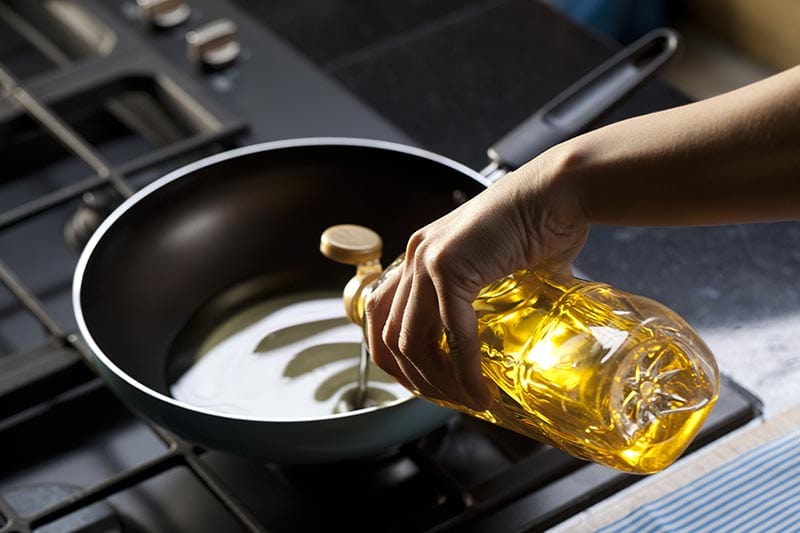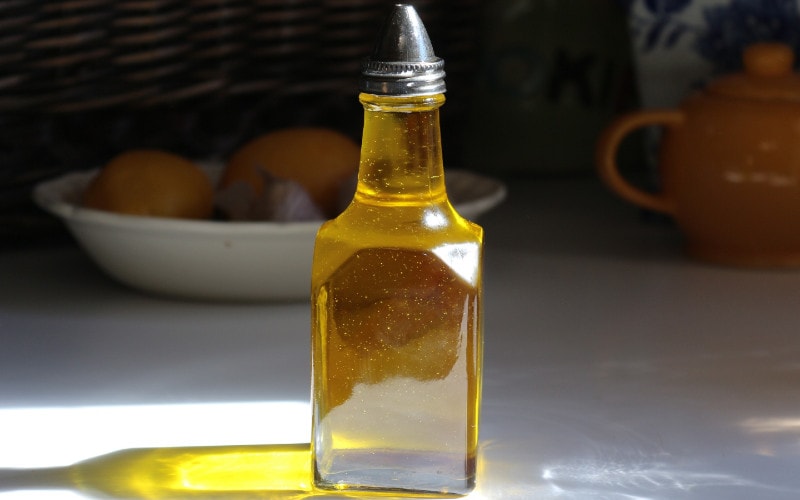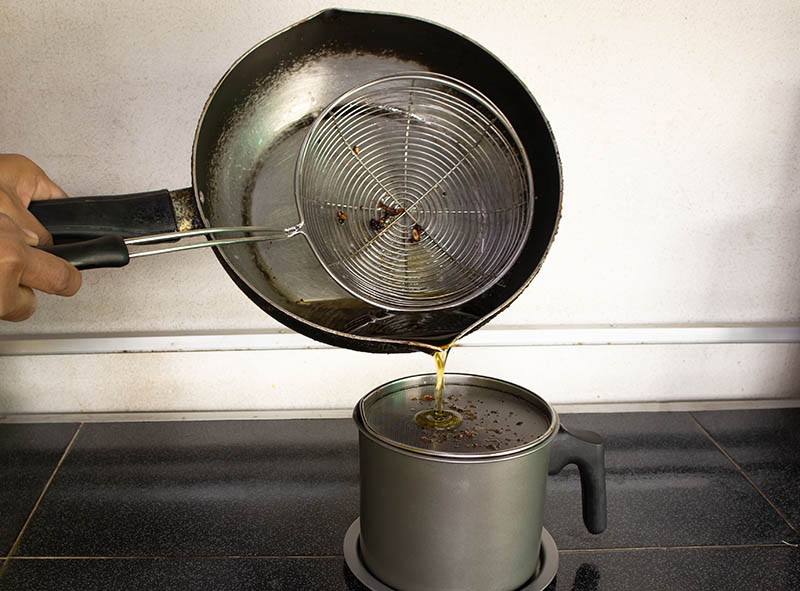Can You Pour Oil Down the Drain? Everything You Need to Know!
-
Kristin Hitchcock
- Last updated:

You should never pour oil down the drain—even in very small amounts. While this isn’t necessarily dangerous, it can clog your pipes and damage local water systems. Oil and water don’t mix, leading to issues if the oil is where the water is supposed to go.
Many homes have grease traps installed to prevent oil from entering the septic tank (where it can cause more issues). In this case, putting oil down your drain can clog your grease trap. Often, a plumber is required to clear up this clog.
Of course, this doesn’t mean that you’ll get a clog if a drop of oil makes it into your drain. However, it often takes less grease to cause a problem than most people think. Therefore, we highly recommend avoiding putting grease down the drain. Instead, dispose of oil in a safe manner.
How to Dispose of Cooking Oil
Disposing of cooking oil safely is actually a bit difficult. There are many bad ways to dispose of oil, like pouring it down your drain. Luckily, there are a few safe methods that can easily be accomplished by most cooks:

- Store it in a jar. Many people store their cooking oil in a jar and cook with it again later. Bacon grease is most commonly saved in this manner, as it can be used to give food flavor later on. Using animal fats in this manner can actually be much healthier than vegetable cooking oils. Even if you don’t use the oils to cook, you can safely throw a full jar of oil into the trash for disposal at your local landfill.
- Use a grease disposal system. There are some grease-disposal systems that are specifically made for getting rid of grease. Of course, these are expensive and often not much different than putting the grease into a jar. However, if you want something specifically for getting rid of grease, give one of these a go.
- You can compost oils as long as it isn’t from meat. The reason for this is that meat oils often attract wild animals and bacteria. Therefore, they often aren’t a great option for composting (though there are some safe composting methods for meat products).
- Mix with something else. You can turn oils into a solid for easier disposal by mixing them with something absorbent. For instance, sand, cat litter, and flour are often used. Simply mix it with one of these products and then throw it away. The oil will make much less of a mess when absorbed by one of these ingredients. It basically takes the place of a jar.
Reusing Cooking Oil
An easy way to limit the amount of oil you need to get rid of is to reuse it. Many oils can be reused, and they often provide better flavor with each use. This is especially true if you use the oil to cook something fatty—like meat. (After all, fat is flavor.)
Reusing oil is very simple. All you need to do is store it in a glass container. An old pickle jar or similar container works well. To store your oil, just wait for it to cool down a bit (to prevent shattering the glass). Then, pour it into the container.
We recommend storing different types of oil separately. Some flavors just don’t work well together. The oil will absorb the flavor of whatever you’re cooking in it. Keep this in mind when reusing the oil—if you cook spicy food in it, the oil will become spicy.
Simply store the oil in the pantry—it will store practically indefinitely. Most of the time, you can reuse oil two to six times before it needs to be disposed of. (At this point, you can simply throw the whole jar away.)

What Happens When You Pour Oil Down the Drain?
We’ve given you many ways to avoid pouring oil down the drain. This is for a good reason as pouring oil down a drain can actually be very troublesome. It causes damage to your pipes, sewer system, and septic tank. Plus, it is illegal in many areas.
When you pour oil down the drain, it will leave behind an oily residue. Because oil is pretty resistant to water, the water moving through the pipes won’t wash it away. Instead, the oil will collect all the debris you put down your drain. As you can expect, this is quite troublesome. Once enough oil and debris have accumulated, you’ll have what is called a “fatberg.” Often, these fatbergs can reach up to 100 pounds.
Oil is very destructive to your pipe and sewer system as these large fatbergs can cause clogs. Water can’t move through oil, especially when it’s also full of food debris. Basically, the fatberg becomes one solid mass in your pipe. In severe cases, this can cause the water to back up into your home. Fatbergs do not go away by themselves; they only get worse.
Of course, you’ll have to pay a plumber to clean away these oil deposits. This can get expensive quickly. Furthermore, in areas where this is illegal, you may face fines if you cause a clog in the sewer system.
Dumping oil down the drain can also harm the environment. Many animals and plants cannot function if covered in oil. Therefore, if a backwash occurs, surrounding wildlife can be harmed. Furthermore, clogs can cause sewers to flood, releasing toxic waste into the environment.
Can You Pour Oil Down the Drain with Hot Water?
No. While oil may seem like a liquid when heated, it will cool down eventually. When it does cool down, it will coat the inside of the pipes. Eventually, enough oil will build up to cause clogs and other issues.
As we’ve explained above, this oil can seriously harm your water system, local sewers, and even the environment. Using hot water doesn’t reduce any of these issues—it just makes the oil travel further.
Conclusion
You should never pour cooking oil down the drain. Oil and water don’t mix, which leads to serious problems if grease ends up in your pipes. Because the water can’t wash it away like other debris, the oil builds up. Eventually, this can cause clogs and other problems. In larger cities, oil can form into large chunks called fatbergs, which can reach up to 100 pounds.
Fixing these problems within your home is a huge issue. You’ll have to hire a plumber to clear the clogs—often by hand. This involves a lot of labor and can get expensive. At the same time, if the oil reaches the sewer system, you may face hefty fines. The city often has to hire a plumber to clean out the oil, and you may have to foot the bill.
Featured Image Credit: ben bryant, Shutterstock
Contents
